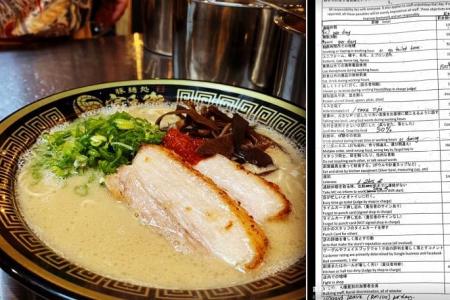KL ramen outlet workers forgo MC to avoid $28 fine
A popular Japanese ramen restaurant in Kuala Lumpur that has found itself in a pickle for fining its staff for a laundry list of reasons has said that the pay cuts are done within “pre-granted incentives”.
But lawyers that The Straits Times spoke to said the penalties may be unlawful.
Netizens were livid when photos of the lists drawn up by Kanbe Ramen first surfaced online earlier in February, showing a RM100 (S$28) fine for absence from work - even with a medical certificate - and a RM500 fine for taking a toilet break during busy periods.
Other fineable “offences” that have been chipping away at staff salaries include using phones during a shift (RM200), and breaking spoons (RM100) or bowls (RM200) used to serve the ramen - utensils which former employees claimed they were never shown receipts for their actual costs by their employer.
Social media posts of the penalty lists, put up by people claiming to be friends or former employees of Kanbe Ramen staff, have gone viral after they were shared on platforms such as Facebook and Xiaohongshu.
Netizens have criticised the restaurant’s human resource policies and called for a boycott of its outlets - in the upmarket Mont Kiara suburb and The Exchange TRX mall - in Kuala Lumpur.
Kanbe Ramen on Feb 22 acknowledged in a Facebook post “confusion and concern” regarding the deductions of their employees’ wages.
It pointed out that its wage structure comprised a “combination of basic pay and pre-granted incentives”, and deductions were “within these incentives”.
“Our salary system is designed to reward hard work and dedication, and we compensate our staff with salaries above market practices,” said Kanbe Ramen.
The discussions on social media have focused on deductions within these incentives, it noted.
“All new hires are fully briefed on this system during the recruitment process,” said the restaurant.
Kanbe Ramen added in its post that it has taken action to address concerns over the issue, without specifying what the actions are. ST has reached out to the company for comments.
The restaurant had made a police report on Feb 20, shortly after issuing an internal memo warning “current and resigned” employees that company policy which was confidential was being circulated online.
Past and present employees at the Kanbe Ramen outlet that opened in Mont Kiara in 2021 told ST that they worked under an intimidating atmosphere, constantly on edge for fear of making mistakes such as keying in wrong orders or visiting the toilet at the wrong time.
Mistakes would be totalled by a supervisor at the end of each shift and marked against the offending employees who would pay their “fines” in cash or have them deducted from their monthly wages.
Several former kitchen and waiting staff, who declined to be named for fear of reprisal, would show up for work even when they were sick to avoid paying a RM100 penalty for taking sick leave.
“I was losing my health, just to avoid being fined,” said one former worker, who recalled putting in many shifts while nursing body aches or shivers from a cold, and for months with a burn wound.
“When the floor manager noticed my injury, she told me to wear a glove to cover it up because customers might be disgusted by the sight.”
Kanbe Ramen is run by F Innovators, a food consultancy group that was set up in Japan and manages restaurants in Singapore, Taiwan and Malaysia.
According to the former employees, the penalty policies adopted by Kanbe Ramen were also applied at other F Innovators-operated restaurants Kanbe Yakiniku and Daruma Syokudo.
Some workers at Kanbe Ramen’s Mont Kiara outlet were getting thousands of ringgit docked from their wages every month, according to pay slips ST has seen.
One managerial employee who was earning over RM6,000 a month took home just half that amount after various deductions, leading to a swift resignation.
Malaysian Human Resources Minister Steven Sim on Feb 22 warned employers against arbitrarily docking workers’ salaries, saying only items covered by the Employment Act (EA) including the Employees Provident Fund, social security and income tax payments could be deducted.
“No matter what type of shop, or big or small company, you (employers) cannot deduct salaries,” he said. “Disciplinary action must go through an internal inquiry process.”
A day earlier, Mr Sim had urged affected workers to officially take it up with the Labour Department (JTK) so action can be taken.
ST understands that at least one former employee had lodged a report with JTK, which ordered Kanbe Ramen to pay back what it docked from the worker’s pay.
But the restaurant’s operator has appealed against the decision, with the dispute to be heard at a Malaysian court in April.
Kanbe Ramen’s employee contracts seen by ST are signed on a rolling basis and automatically renewed after every three months. Various fines are written into the agreements signed by new hires.
But these may be superseded by labour laws, said Mr Donovan Cheah, who heads the employment law practice at Donovan & Ho in Kuala Lumpur.
“Fines or penalties imposed by the employer are not lawful deductions under the Employment Act, even if contractually agreed by the employee,” he said.
“This is because any terms in an employment agreement that are less favourable than those in the EA are rendered void and of no effect.”
Mr Cheah added that, however, employees are not exempt from compensation if they damage company property or assets.
“The prohibition in the EA is that employers cannot make these kind of deductions from an employee’s salary. Claiming compensation from an employee, assuming there is a legal basis, has to be done separately,” he said.
Mr Naveen Solomon, senior associate at Selangor-based MahWengKwai & Associates, added that Kanbe Ramen’s claim that deductions were made out of incentives or performance allowances may not hold up in court, as it could be considered as part of basic wages.
“The only allowance not part of wages would be travel, or any allowance given as a result of expenses incurred due to the nature of the job,” he said.
Having been through the ordeals of being placed under a pressure-cooker work environment, always anxious about making a mistake, some of Kanbe Ramen’s former employees hope the experience stops with them.
“I just hope (Kanbe Ramen) adheres to Malaysian labour laws, and stops using legal loopholes and contracts to lock its employees, but check whether its rules are reasonable,” said one former worker.
Get The New Paper on your phone with the free TNP app. Download from the Apple App Store or Google Play Store now



